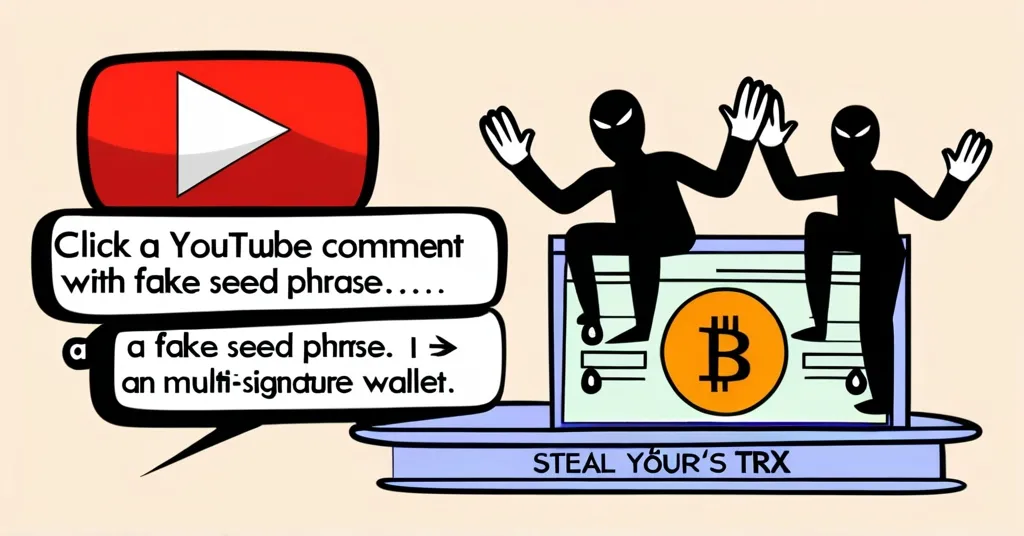New Crypto Scam Exploits YouTube Comments and Multi-Sig Wallets to Steal TRX

New Crypto Wallet Scam Targets YouTube Comments: Multi-Signature Trick Steals Funds
Cybersecurity firm Kaspersky has uncovered a sophisticated new scam that exploits YouTube comments to deceive users into depositing funds into multi-signature wallets. The scam promises access to free USDT but instead steals any TRX deposited for transaction fees. This latest scheme underscores the ongoing challenges of security and trust in the crypto world.
- Scammers post fake seed phrases in YouTube comments to lure users into accessing wallets with USDT.
- Victims must deposit TRX for gas fees, which scammers steal using the wallet’s second signature.
- Kaspersky labels this as “ethical deception,” targeting those trying to exploit abandoned wallets.
Imagine you’re scrolling through YouTube and stumble upon a comment that reads, “I have USDT stored in my wallet, and I have the seed phrase. How to transfer my funds to another wallet?” Sounds tempting, right? Well, it’s a trap. Scammers are posting these comments with fake seed phrases, baiting users into accessing wallets that appear to hold USDT, a stablecoin designed to maintain a stable value. But here’s the twist: these wallets are multi-signature, meaning multiple signatures are required for transactions. A seed phrase, essentially a series of words acting as a key to your crypto wallet, should never be shared publicly. Yet, when you try to access the wallet and deposit TRX to cover the gas fees—the cost of processing transactions on the blockchain—the scammers, who control the second signature, swoop in and steal your TRX.
Kaspersky describes this scam as a form of “ethical deception” because it primarily targets individuals attempting to exploit seemingly abandoned wallets. It’s a clever twist on the old adage, “Don’t be greedy,” because those looking for a quick profit end up losing their own funds. The cybersecurity firm warns users to remain vigilant and never access wallets with shared seed phrases, no matter how tempting the bait might be.
This scam is just one example of the increasingly sophisticated attacks plaguing the cryptocurrency ecosystem. Recently, blockchain investigator ZachXBT reported a coordinated scam that hacked over 15 X accounts, stealing around $500,000 from investors in Solana meme coins. These incidents highlight the urgent need for better security measures and education within the crypto community.
Let’s break down how multi-signature wallets work. Think of them like needing multiple keys to open a safe. If one key holder is a scammer, they can redirect funds once you deposit them. This feature is typically used to enhance security but can be exploited in scams like this one. Understanding these technical aspects is crucial for protecting yourself from such deceitful schemes.
The ethical debate surrounding cryptocurrencies is complex. While blockchain technology holds promise for decentralization and financial freedom, it’s also exploited by bad actors. George Calhoun from Forbes argues that while blockchain itself may be neutral, its applications in cryptocurrencies can lead to significant ethical issues, including fraud and criminal activity. This broader ethical context underscores the importance of vigilance and ethical conduct in the crypto space.
To safeguard your accounts, follow ZachXBT’s recommendations: don’t reuse email addresses across services and use security keys for two-factor authentication (2FA) on important accounts. These measures can significantly reduce the risk of falling victim to phishing attempts and hacks. And remember, in the spirit of effective accelerationism and the pursuit of decentralization, we must champion the technologies that promise to disrupt the status quo while staying vigilant against those who seek to exploit them.
The real-world impact of crypto scams can be severe. For instance, the Cardano Foundation hack led to a significant drop in ADA price, illustrating the tangible consequences of such incidents on the market and investors. This serves as a stark reminder of the need for robust security measures and continuous education within the crypto community.
Key Takeaways and Questions
What is the new crypto scam uncovered by Kaspersky?
A scam using multi-signature wallets and shared seed phrases targets YouTube comments, tricking users into depositing TRX, which scammers then steal.
How does the scam utilize multi-signature wallets?
The wallet requires multiple signatures for transactions, allowing scammers to control the second signature and reroute any deposited TRX.
What is the role of TRX in the scam?
TRX is required to cover gas fees for transferring USDT, but once deposited, it is immediately siphoned off by scammers.
What is meant by “ethical deception” in the context of the scam?
“Ethical deception” refers to the scam targeting individuals who are trying to exploit seemingly abandoned wallets, essentially turning opportunists into victims.
What other recent scams were mentioned?
A coordinated scam reported by ZachXBT involving the hack of over 15 X accounts and theft of around $500,000 from Solana meme coin investors.



